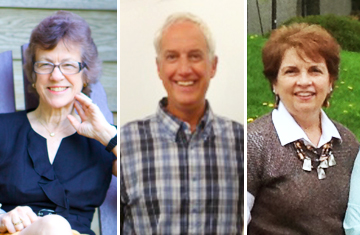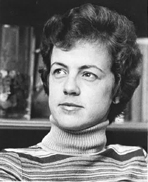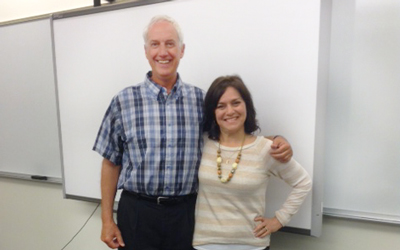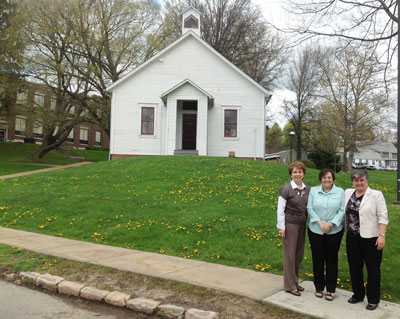Three full-time faculty members are retiring from Cabrini this May:
- Assistant Professor of Education Maryann Lanchoney, EdD
- Chair and Professor of Philosophy Sharon Schwarze, PhD
- Associate Professor of Exercise Science and Health Promotion Tony Verde, PhD
“Sharon, Tony, and Maryann have all contributed greatly through their teaching and service to Cabrini students,” said Jeff Gingerich, Provost and Vice President for Academic Affairs. “Our College would not be the same place without their dedication to the Cabrini mission.”
As we wish them well in the next chapter of their lives, we recognize each of their accomplishments and impact on the Cabrini community.

(left-to-right) Sharon Schwarze, PhD, Tony Verde, PhD,
and Maryann Lanchoney, EdD
Sharon Schwarze, PhD, 45 years of service
Sharon Schwarze, PhD, came to Cabrini 45 years ago, when in 1971 she met with Joseph Romano, PhD, then Chair of the Philosophy Department at Cabrini, who hired her to teach philosophy.
“Sharon and I go way back!” Romano said.
“I remember well how impressed I was with her command of philosophy. We had interviewed several candidates and she was head and shoulders above the rest. I don't think I ever told her that.”
In 1979, Schwarze took over as Chair while Romano served as Vice President of Academic Affairs. In a reversal of roles, when Romano returned to the faculty in 1988, Schwarze was his department chair.
“Only people who really get along can swap jobs and authority in the most agreeable way!” Romano said.
Schwarze’s contributions to Cabrini are “legion,” as Romano puts it. She was active in enriching the intellectual life of the college, establishing the Honors Program, serving as President of Faculty Senate, and running faculty development programs in the summer.
Through these programs, Schwarze brought leading scholars to campus to discuss important and timely works, which then informed the reading list for the core curriculum.
She also secured a National Endowment for the Humanities grant toward a new core curriculum and helped develop that curriculum, which set the foundation for our current signature Engagements with the Common Good (ECG) core courses.
“This was truly a groundbreaking event in the academic life of Cabrini College,” Romano said. “Preparation for the new core brought faculty members together from every discipline—studying together as colleagues in the learning process.”
“Sharon is a philosopher deep in her soul,” said Kathleen McKinley, Chair and Professor of Sociology. “She is still optimistically searching for truth through reason. She loves her discipline and it shows.”
McKinley came to Cabrini the same year as Schwarze, and has been a close colleague ever since. They were even close in the literal sense, as their offices were across the hall from each other in the basement of Founder’s Hall.
“She is my go-to person for discussing so many professional and contemporary issues,” McKinley said. “In fact, just the other day she alerted me to the New Yorker article on Desmond’s book, Evicted. We share a common love of reading and often discuss social, economic, and political issues.”
Years ago, McKinley taught a first-year course with Schwarze, in which they read Billy Budd and Antigone, Freud and Marx.
“You can tell that her objective is not to lecture, but to draw out thought and encourage students to think critically about the material,” McKinley said. “We had some great discussions in that class.”
With colleague Harvey Lape, who retired in 2015, Schwarze wrote Thinking Socratically (Prentice Hall), now in its third edition, to encourage students to apply critical thinking to a variety of contexts and events. The text is used in colleges and universities across the country.
Over her years at Cabrini, Schwarze has watched students gain knowledge, a process she refers to as “awakening.” The most rewarding aspect of teaching at Cabrini for Schwarze is seeing students awaken, graduate, and succeed.
One project that Schwarze championed at Cabrini that has made a particularly noteworthy impact is the ECG class that works with the Mount Pleasant community, just down the road from campus, where some Cabrini students seek off-campus housing.
There has been tension between Cabrini students and the residents of Mount Pleasant, stemming from a decades-long culture clash. The goal of Schwarze’s work with the community is to bridge the gap between Cabrini students and Mount Pleasant and create a more reconcilable relationship.
“I think helping Cabrini students become more aware of their responsibilities as neighbors to the Mount Pleasant community has helped to create more respect between our two communities,” Schwarze said.
“Her work with ECG students on the community of Mount Pleasant exemplifies how her students respond to real social issues of justice,” Romano said.
As for her plans after retirement, Schwarze is eyeing the pile of books on her study table; without all of the papers she typically spends her weekends grading, she’ll have the time to read them.
“I also want to do more photography and travel,” Schwarze said. “I’m headed to Italy this summer, to the National Parks this fall, and Barcelona next summer. I also look forward to spending time with my daughters and my grandchildren.”
“Cabrini has been my community for 45 years,” she said. “We’ve shared the ups and downs, the work and the fun. Obviously this community has changed over time. But there’s always been a sense that we’re building something—together. I am going to miss my friends, both faculty and students, and the talks that we share, especially about philosophy and politics!”
Of course, Schwarze couldn’t leave Cabrini without one last undertaking—she hired two new assistant professors in the Philosophy program who will continue to ask the “important questions,” as Romano said, carrying on the legacy of the program that Romano and Schwarze began so many years ago.
Tony Verde, PhD, 23 years of service
When Tony Verde, PhD, wrote letters to colleges and universities in the area about becoming an adjunct faculty member in 1993, one person who read the letter and subsequently called him in was then-Professor of Biology Anna Kruse.
“I wouldn’t be here if it weren’t for Ann,” Verde said of the Kruse, whom he remained close with until her passing in 2014.
Verde taught immunology courses part time at Cabrini before Kruse, Mother Ursula, and then-President Toni Iadarola persuaded him to join the College full time to head the new Exercise Science and Health Promotion program. In 1996, Verde started the program and remained Department Chair until this year.
“I have always felt, after meeting and speaking with Mother Ursula on a number of occasions, that my coming to Cabrini was more of a vocation for me rather than a career path,” Verde said.
Starting the program was the first of many changes Verde made in the Cabrini community over the past two decades.
As the inaugural Executive Director of the Dixon Center—which opened in April 1998—he created all job descriptions and hired all staff needed for building operations, Aquatics, the Fitness Center, and Intramurals and Recreation. He held that position from 1996 to 2005.
Maria Elena Hallion, PhD, has worked with Verde from the time he hired her to run the new fitness center, and only three months later she started full time as faculty in the Exercise Science and Health Promotion Department.
“A two-person department is very unique and it has just been us all this time,” Hallion said. “My work life is going to change a lot when he leaves.”

Tony Verde, PhD, and Maria Elena Hallion, PhD, during Verde's last class at Cabrini
Adding to his roles at Cabrini, Verde took over the golf program in 1999 and grew the program into the strong team that it is today. The team has placed 1st or 2nd in the Colonial States Athletic Conference seven out of the last nine years and qualified for the NCAA National Championships four times during that same time span.
Verde also played an integral role in bringing World Team Tennis and the Regional Olympic Games for Blind Athletes to campus. And, in response to an appointment by the Board of Trustees, he founded Cabrini College’s Institutional Review Board and served as its Chair for its first seven years of existence.
“In a small college like Cabrini, you end up wearing so many hats at different times,” Verde said.
Cabrini has been a “family affair,” as noted by Verde’s wife, Lorraine, who began working at the College 10 years ago and also is retiring in May. Two of their sons have taken classes at Cabrini—Greg in the Business Administration program and Steve in the Master of Accounting program.
“Tony’s favorite thing about Cabrini is the mission,” Lorraine said. “He is a fairly regular participant at weekday morning masses. He loves the Missionary Sisters. Tony used to do many volunteer projects for the nuns when they were on campus and was a regular visitor to their nursing homes.”
“I will deeply miss my interactions with the Missionary Sisters of the Sacred Heart of Jesus, the Cabrini Mission Corps, and Campus Ministry,” Verde said. “I feel blessed to have had the opportunity in my life to come to Cabrini College and be part of Mother Cabrini’s legacy for the past 23 years.”
Though he is retiring from his faculty position, Verde will remain part of the Cabrini community as the Head Golf Coach, and admits that he’ll often continue to make the 15-minute trek from his home to his second home, Cabrini’s Dixon Center (and soon, the Athletic & Recreation Pavilion).
Maryann Lanchoney, EdD, eight years of service
Though Maryann Lanchoney, EdD, began teaching part time at Cabrini in 2008, her first time on campus was in 1957, before it even opened its doors as a college.
In the early 1900s, her grandmother farmed a plot of land owned by Mother Cabrini’s Missionary Sisters of the Sacred Heart of Jesus (MSCs) in the Overbrook neighborhood of West Philadelphia.
The land was part of their convent and the orphanage the MSCs established not far from their other institution, St. Donato’s Parish. (In 2013, St. Donato’s Parish merged with Our Lady of Lourdes Parish; the school is now St. Frances Cabrini Regional High School.) Lanchoney grew up in this parish, among the MSCs, who invited Lanchoney and her grandmother to the “countryside” to the estate that would soon become Cabrini College.
After she graduated from high school, Lanchoney married and moved to New Jersey, where they raised four children. When their children all moved to Pennsylvania decades later, Lanchoney and her husband decided to follow.
“The day that we moved back to Pennsylvania, I started teaching at Cabrini College—51 years after I first set foot on campus,” she says. “I told this story to Sister Christine [Marie Baltas, MSC] who said, ‘You know, dear, that once Mother Cabrini has you, she will never let you go.’”
The connections between Lanchoney and Cabrini College did not stop there. Lanchoney discovered that she shared a parallel walk of life with Maria Small, Coordinator of Student Teacher Placement and Certification at Cabrini, who also grew up on the same block in Overbrook, part of St. Donato’s Parish, and whose grandfather also tended to the MSCs’ garden behind their convent.
“Although we were not on the playground at the same time—it was about a decade apart—our memories are very similar,” Small says.

(left-to-right) Maryann Lanchoney, EdD, Maria Small, and Colleen Poole in front of an old schoolhouse on a university's campus
At Cabrini, Lanchoney has worn many hats. In the beginning, she taught EDG 505 Introduction to Exceptional Children in the Graduate Education Department as an adjunct faculty member.
“I loved teaching these graduate students who were pursuing their teaching certificates,” she said. “Most were career changers and were very excited about the prospect of beginning this new path.”
She quickly became more involved, serving as Field Supervisor, visiting and supporting student teachers in their school settings.
A favorite story among the Education Department is about Lanchoney’s first experience as a field supervisor. She had asked Colleen Poole, Field Experience Coordinator at Cabrini, for a list of students who were completing their student teaching at the school she was about to visit. Because students worked with many different teachers at the school, the list noted that the teacher “Will Vary.”
Eager to connect with the teachers at the school, when Lanchoney arrived, she asked for “Mr. Vary.” Poole and Small haven’t let her live it down!
For her next “hat,” Lanchoney became full-time faculty and Director of Student Teaching in 2010, helping to arrange placements for student teachers in school districts, before serving as Interim Chair of the Education Department while Beverly Bryde, EdD, was on sabbatical.
After a restructuring of the Education Department, Lanchoney stepped into the role of Director of Partnerships, Student Teaching, and Field Experience in the Teacher Education Department.
About her experience at Cabrini, Lanchoney said, “Having the opportunity to employ Mother Cabrini’s Education of the Heart to support these students as they unfold into wonderful educators makes my heart sing. I will miss the students and my phenomenal colleagues.”
Mother Cabrini’s influence on Lanchoney inspired her to make a generous donation to the Disability Resource Center at Cabrini, in order to purchase equipment and materials needed to help Cabrini students with special needs.
She encourages her students, many of whom will go on as special-education teachers, to recognize that there are limitless ways to help others learn and that technology is making assistance available across a broad spectrum of needs. Through her gift, she feels that she can empower more students to succeed.
After retiring, Lanchoney plans to spend quality time with family and will attend the Pilgrimage to the Holy Land, guided by Director of Campus Ministry Father Carl Janicki, in January 2017.